Diagnosis, vaccination, and biosecurity to control BVDV
Por admin en Events, News, Technical talks“We must take a three-pronged approach to address the problem: diagnosis, prevention through vaccination and biosecurity of facilities”.
Said by Dr. Paul Walz, of the College of Veterinary Medicine at Auburn University, Alabama, in the United States, during the 3rd International Congress of Bovine Viral Diarrhea Virus (BVDV) organized by Bioinnovo, within the framework of its 10th anniversary. The presentation was led by Demian Bellido, Leader of New Generation Bovine Vaccines at Bioinnovo – Vetanco, together with the announcer, Florencia Nieto.

Award given to Andrés “Andy” Wigdorovitz together with Demian Bellido
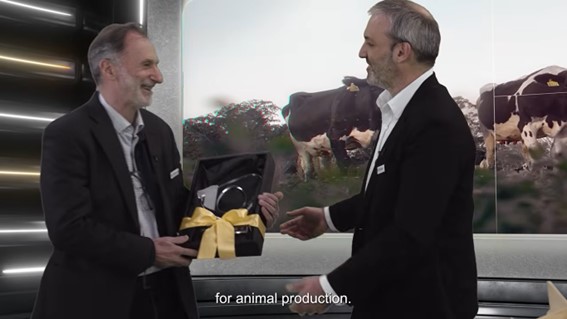
Jorge Winokur and Demian Bellido

Ariel Pereda, General Director of INTA
As part of the welcome, awards were presented to Andrés “Andy” Wigdorovitz, Scientific Director of Bioinnovo; Jorge Winokur, President of Vetanco and Ariel Pereda, General Director of INTA, in recognition of the company’s years of operation. In addition, the President of INTA, Juan Cruz Molina, gave a speech highlighting the research and development of biotechnological solutions applied to animal health that Bioinnovo has promoted since its beginnings and the importance of addressing this issue which has great impact on production.
The aim of the meeting was to discuss and propose strategies for the control of a virus that affects cattle of all breeds at different stages of development and, therefore, has a great impact on production systems, both in breeding and fattening, and dairy herds.
“Diagnosis is the science and art of identifying a disease from its signs and symptoms, although, unfortunately, these are not specific in the case of Bovine Viral Diarrhea Virus (BVDV). That is why this diagnostic detection capability must be reassessed,” said Walz.
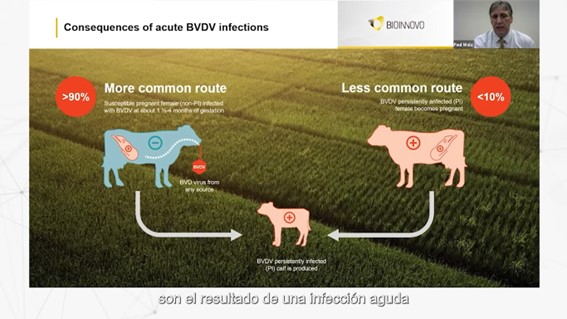
Presentation by Dr. Paul Walz, College of Veterinary Medicine, Auburn University, Alabama, United States
“Vaccines are a very important part of the control process, and then we must use biosecurity and biocontainment principles to limit the spread and help control BVDV in cattle herds,” added the expert, who is also a coordinator of animal health research at Auburn University and one of the world’s leading experts on BVDV.
“In my experience, when we could not manage these three issues we have failed to control the VDVB in the cattle herd. Hence the importance of thinking of all the tools to try and control the virus,” he said.
This year the event was held under the motto “Impact and Management of BVDV in Cattle Herds”, under the virtual and free modality and was broadcasted live through the YouTube channel of Vetanco Latin America. More than 700 people connected from over 20 countries in the Americas participated in the event, including field veterinarians, reproduction consultants, scholarship holders, and researchers.
Dr. Julián Bartolomé, professor at the School of Veterinary Sciences of the National University of La Pampa (UNLPam), referred to the relevance of a good reproductive performance in livestock farms, an aspect that has a great impact on the company’s financial performance.
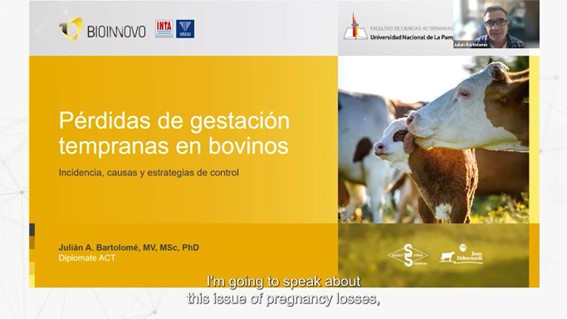
Dr. Julián Bartolomé, professor at the School of Veterinary Sciences of the National University of La Pampa
During the talk, results from an assessment of the impact of early embryonic and fetal losses, especially up to day 150 of gestation, were presented. Several factors are involved here, with BVDV being one of the most important.
“Within this framework, pregnancy rate, embryo losses, and abortions, among others, are determining factors in affecting bovine reproductive indices,” said Bartolomé, who is also a specialist in bovine reproductive physiology.
In another part of the congress, during the lecture by Dr. Mrigendra Rajput, who leads a research group at the University of Dayton, Ohio, United States, studying the interaction of viruses with immune system cells, addressed the topic of immunosuppression, which is one of the main effects and hallmarks of this virus in cattle.
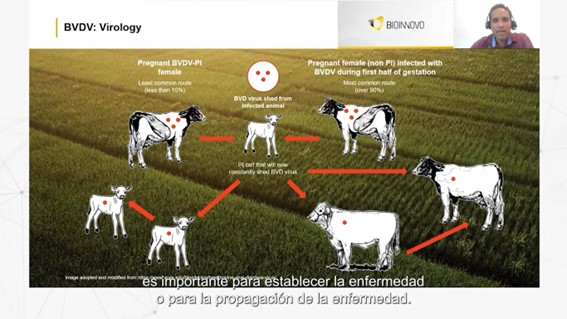
Presentation by Dr. Mrigendra Rajput, who leads a research group at the University of Dayton, Ohio, in the United States
He also discussed how the BVD virus affects the different cells, mechanisms, and metabolic pathways in the infected animals, impacting both on the quantity and functionality of different immune system cells, such as macrophages, lymphocytes, neutrophils, and dendritic cells, among others.
Rajput discussed the mechanisms by which this virus causes a weakened immune response in infected animals, affecting both the innate and adaptive immune systems and how this has a direct impact on bovine production.
Finally, Dr. Viviana Parreño, from the National Institute of Agricultural Technology (INTA), presented the results of a longitudinal study conducted in six dairy farms in different Argentine provinces, where data from more than 250,000 services that resulted in more than 80,000 deliveries during a period of 10 years were analyzed.
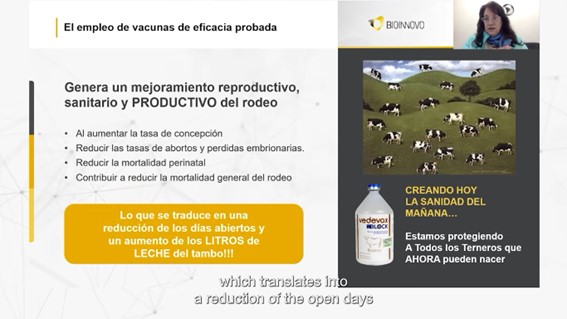
Lecture by Dr. Viviana Parreño, from INTA
Likewise, Parreño conducted a thorough statistical analysis of different variables associated to productive, reproductive, and sanitary parameters in the dissertation entitled “Systematic Vaccination in Dairy Herds” and determined that a significant improvement was observed in all the farms analyzed after the introduction of the Vedevax BLOCK vaccine.
“Among the most outstanding variables, it can be stated that, after the application of the vaccine, the reproductive indices improved, with an increase in the conception rate and a decrease in abortions, leading to a reduction in the days open and an increase in the reproductive efficiency of the facility,” explained Parreño, who is one of the leading figures in national virology, has developed her career at INTA and abroad, and has vast experience in research and development of tools for the prevention of bovine viral diseases.
“Likewise, there was a decrease in perinatal mortality and total mortality in the cattle herds, as well as an increase in milk production of around 9%,” concluded the researcher.
The event was closed by Vetanco’s Commercial Manager, Adrian Balbi, who thanked the exhibitors and participants. “We would like to highlight the high quality of the lectures that were part of this edition and we invite you to be part of 4th International Congress of the DVB Virus, to be held in 2026,” he concluded.

Closing by Adrian Balbi from Vetanco
Bioinnovo is the first public-private technology-based company (EBT) formed by Vetanco and INTA, dedicated to the research, design and development of IgY antibodies, recombinant vaccines and the provision of specialized services for animal health.
To relive the full Congress, visit: https://www.youtube.com/watch?v=ST6J8Y_SosM&t=6304s

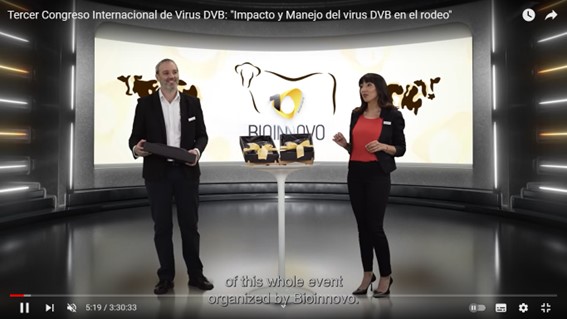
No Comment